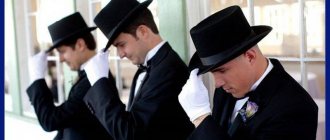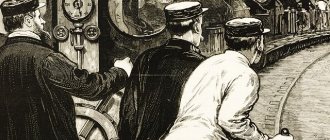Hello, dear readers of the KtoNaNovenkogo.ru blog. We often hear how, during a heated debate, one of the opponents calls the other a hypocrite.
As a rule, the person to whom this characteristic was uttered feels insulted and tries in every possible way to prove the opposite.
Who is a prude, and why don't people like it when they are awarded this nickname?
Who are bigots in plain English?
Modern society is distinguished by rather liberal views in everyday life, and this is manifested in a relatively free attitude to what is happening.
In society, it is customary to contrast free views with sanctimonious ones, and in this case, a free attitude to life is considered healthy and is the norm for most of society. In such a situation, everyone should understand who the “hypocrite” is.
Meaning of the word
Different dictionaries provide different interpretations of this word.
The most common use of the word “prude” is to mean a person who is a hypocrite, hiding behind ostentatious piety, and focuses on strict adherence to various rules, mainly with one goal, so that his behavior stands out and is noticed by others. That is, this is an outwardly pious person, but in reality he is not.
The second meaning assumes that such a hypocrite is engaged in deliberately seeking out shortcomings in others with the aim of further censure. He himself does not notice his shortcomings, even if they are the same as those that he ridicules.
According to the entry in Dahl's dictionary, a bigot is a two-faced person, a pretender who talks about his imaginary piety. In addition, in some regions a beggar and a slut are called a prude.
In Ozhegov’s dictionary, this lexeme corresponds to the meaning of false holiness or chivalry, a crafty person.
That is, this is a person who deliberately emphasizes his compliance with certain standards, and this compliance exists only in words.
In speech, this word is often used, moreover, the term “hypocrite” became widespread after the collapse of the USSR, when many people turned to the church in order to receive certain benefits and fit into society, and not with the goal of saving their souls and faith.
It happens that a person is susceptible to propaganda and tries to “keep up” with the crowd, often masking his unseemly actions and hiding his real views.
Traits of a prude
There are two features of hypocrisy:
- double standards in relation to others and to oneself;
- inflated claims towards people.
The favorite pastime of the classic bigot is teaching others and defending his point of view. However, his own internal content often does not correspond at all to the views he declares. The prude tries to pass herself off as a sincere, unselfish person, reads morals, evaluates everyone around her, and engages in sophistry (substitution of concepts using speech tricks).
He tends to use lexemes in his speech: tolerance, justice, equality, honesty, openness.
It is worth considering that in addition to conscious hypocrisy, when a person pretends to be a person with high moral qualities, there is also unconscious hypocrisy. Unfortunately, it is often a symptom of a mental disorder that requires medication or psychotherapeutic treatment.
As a rule, this is a type of self-deception and a subconscious attempt to hide your unsightly sides in order to maintain respect in your social circle. An unconscious hypocrite not only lies to himself, but may be aggressive and unable to adequately perceive the world around him.
History of the word "bigot"
In Ancient Rus', before the word “hypocrite” entered the Russian language from the Arabic language, the word “pustosvyat”, endowed with a similar meaning, was actively used. The term itself is believed to have been one of the first to be used in his work by Omar Khayyam to denounce two-faced people.
By the way, in Russian literature, the image of a prude has also been repeatedly used, for example, in Ostrovsky’s play “The Thunderstorm” this was the character of Kabanikha. And Alexander Kuprin’s essay “Prudence” is completely devoted to the phenomenon of hypocrisy, which the author reveals using the example of hangers-on in holy places.
Most linguists are confident that the word “bigot” is of Arabic origin, because similar words exist in Turkish and Arabic, and they have almost the same sound.
Initially, the words “haji” and “haji” meant pilgrims, but over time they acquired an ironic connotation, and then a negative one. And all because the pilgrim looks like a pious person, but piety can be superficial, because there have been cases of unworthy behavior among pilgrims, prompting one to doubt their faith.
If you are trying to determine whether someone in front of you is a prude, you should take the advice of psychologists, take a closer look at whether the words of the object of observation correspond to his actions, whether he works for the public, whether he shows tolerance for the shortcomings of the people around him.
If this person matches the above factors in any way, it is likely that you have observed a prude.
However, you should not judge others too harshly; you should always look after yourself first and evaluate your actions.
Use in conversation
In modern speech, the word “bigot” is used quite often . Moreover, the term gained additional popularity after the collapse of the Soviet Union and the conversion of many new people to the church. Unfortunately, today the most widespread religion in the country often serves not only as a way of development and salvation of the individual, but also as a way of socialization and acquisition of purely earthly goods.
The imposed propaganda of spirituality and patriotism often creates not real feelings, but a sanctimonious attitude towards these very significant aspects of human existence. Therefore, the word “hypocrisy” comes in handy in order to mark and highlight such phenomena.
Examples:
Schoolchildren saw a tipsy teacher at graduation and realized his sanctimonious nature.
Ivan was not a prude and was normal about the shortcomings of other people; he looked after himself more.
Probably, an unlimitedly sanctimonious attitude towards reality can cause mental disorders or internal dissonance.
At this event there is complete hypocrisy, you look into the faces of these people and you understand - they only think about their own benefit, and speak with such pathetic slogans.
Your sanctimonious attitude will not improve your own reputation; on the contrary, you will have to live up to your own high standards, which you cannot do.
Meaning of the word bigot
The word "hypocrite" has Arabic roots and literally means "pilgrim" or "Muslim who has made the pilgrimage to Mecca." It appeared in Russian in the 18th century and acquired a different meaning due to an ironic attitude towards people of other faiths.
According to the explanatory dictionary, this word can be used in two meanings:
- A hypocritical person who demonstrates false piety and goodness in order to achieve selfish goals.
- A prude is a person with double standards, inclined to blame other people for the same offenses that he himself commits.
The first characteristic fully corresponds to the classic definition of a hypocrite. In the second case, in addition to the desire to disguise his true nature, the bigot acts as an active accuser.
He not only misleads others about himself, but also condemns other people for violating moral principles. At the same time, the bigot himself does not even try to meet the high standards that he imposes on society.
Synonyms for the word are empty-headed, two-faced, Pharisee. Words with opposite meanings – saint, believer, man of free views.
Connection with cynicism
Cynicism is the denial of cultural values and traditions, an immoral attitude towards the latter. This concept also includes a demonstrative refusal to follow established norms (morality and law). However, in the case of cynicism, everything happens exactly the opposite; a person too directly shows his dissatisfaction with established norms, promoting his own vision of the situation, and often imposing it.
It is important to note that neither hypocrisy nor cynicism is approved by society. At the same time, it does not matter - simply because the average person is not interested in the reason - whether hypocrisy is conscious or not, and whether cynicism is feigned or real. At the everyday level, a bigot is an ordinary hypocrite, and a cynic is a marginalized person who is unable to fit into society.
In general, both phenomena are inherently a form of denial of social demands, but hypocrisy is a perversion of norms, and cynicism is their open rejection.
Bigotry is a form of hypocrisy
From the above it follows that the bigot is a prominent representative of the army of hypocrites with whom society has been fighting for a long time and so far unsuccessfully.
Armed with double standards, he easily adapts to society, skillfully pretending to be a fighter for moral ideals. It can be quite difficult to recognize a pretender; to do this you need to show remarkable insight.
A characteristic feature of a bigot is his tendency to actively accuse and impose his opinion. In this respect, he is fundamentally different from the classic hypocrite, who only needs to hide his true face from others.
Hypocrisy can be conscious or unconscious. In the first case, it helps to win public recognition and realize selfish interests, in the second, it forms the basis of a worldview, shapes personality and character.
A conscious pretender skillfully manipulates others, playing on their complexes, fears and feelings of guilt. Cruelly deceiving others, he extracts from them certain actions and decisions that are beneficial only to him. A conscious prude understands perfectly well the motives for his ostentatious actions, but will never admit it.
In the case of unconscious hypocrisy, a person engages in self-deception due to the fear of being himself and the inability to recognize the shadow sides of his own personality. Deep down in his soul, he feels that he is disingenuous, but with all his might he demonstrates compliance with the accepted ideas of morality in society, hiding his true nature, which is far from perfect.
Unconscious hypocrisy is akin to a disease. Not everyone is able to notice its insidious symptoms in themselves.
What is worse – hypocrisy or cynicism?
To compare such human qualities, you need to understand their essence. Cynicism refers to neglect and immoral attitude towards cultural traditions and values, a demonstrative refusal to comply with generally accepted social and moral norms. Unlike hypocrisy, cynicism involves open, frank expression of one's ideas without deception or hypocrisy.
There is no clear answer to the question of which behavior would be worse - sanctimonious or cynical. The majority is of the opinion that neither the first nor the second is acceptable in society
It doesn’t matter whether conscious or unconscious hypocrisy is a typical example of hypocrisy, and cynicism is an outright disregard for the rules of morality, both are the result of immorality and denial of traditional principles, which is unacceptable for the development of a decent and mature society
How to recognize a prude
Recognizing hypocrisy in yourself and others is not an easy task, but it is completely solvable. Let us list the main features of sanctimonious behavior:
- Demonstrativeness in actions, ostentatious virtue.
- Adherence to stereotypes.
- Going to extremes.
- Criticism and pickiness.
- The desire to teach and impose one’s opinion.
- The discrepancy between real actions and declared slogans.
- Lack of straightforwardness in statements.
A prude is a person who demonstrates to others his commitment to moral and ethical standards. To be more convincing, he can publicly repent of some minor offense.
However, this pretender, as a rule, is silent about his real sins. Like any manipulator, a prude rarely speaks directly about his intentions. He prefers to get what he wants from people by instilling in them false ideas and motives.
This person's thinking is subject to stereotypes, which does not allow him to form a progressive view of things. But what a prude really knows how to do is actively teach, impose and criticize.
Distinctive features
A prude is a person who hides his true views. But as we have already understood, there are certain “symptoms” by which we can try to identify such a person.
- There is a serious gap between word and deed. This is especially noticeable in issues related to ethical standards.
- Often a demonstrative positioning of one’s good qualities and purity of intentions. At the same time, deception does not disappear from the actions of such people.
- Attributing oneself to people of “high morality”, pious people, adherents of strict morality.
- Playing to the public as a distinctive feature. It’s easy to complain publicly about the immorality of society.
- Sometimes a feeling of guilt can be traced in behavior; a person appeals to his past experience, comparing himself “yesterday” and “today,” talking about moral growth.
How to deal with hypocrisy in yourself and others
Psychologists say that it is almost impossible to re-educate a bigot against his wishes. All you have to do is stay away from such people and make sure you don’t turn into one of them yourself.
Here are some recommendations on how to overcome hypocrisy in yourself:
- Recognize the right to imperfection for yourself and others.
- Give up the desire to please everyone.
- Be honest with yourself and others.
- Define your own goals and follow them.
- Be open to new things.
- Avoid stamps.
- Develop a creative attitude towards life.
When a person begins to truly love himself and accept his own shortcomings, he stops finding fault with others and blaming them for his problems. In place of the grumbling prude who is always dissatisfied with life, there comes a self-sufficient personality open to the world and people (who is this?).
Good luck to you! See you soon on the blog pages KtoNaNovenkogo.ru
* By clicking on the “Subscribe” button you agree to the privacy policy.
Collections by topic
- Questions and answers
- I use it to earn money
- Useful online services
- Description of useful programs
I use it to earn money
- WorkZilla - remote work for everyone
- MiraLinks - pay for posting articles
- GoGetLinks - website monetization
- Questionnaire - they pay for passing tests
- Etxt - pay for writing texts
- Qukoment - comment exchange
- Finding the best exchange rate
- 60sec - profitable cryptocurrency exchange
- MyOpinion - bonuses for completing surveys
- Binance - a reliable cryptocurrency exchange
- VkTarget - earnings in social networks (VK, OK, FB, etc.)
Category: Answering frequently asked questions
Main Characteristics of Hypocrisy
Main characteristics of hypocrisy:
- demonstrative behavior;
- the discrepancy between the virtues demonstrated by a person and his true essence;
- extremes in the denial of immorality.
Hypocrisy can be conscious (hypocritical) and unconscious (unconscious). Hypocrisy in the form of conscious hypocrisy manifests itself in a kind of “wearing a mask” of a highly moral personality with an obvious conscious discrepancy between the real moral image and the “mask” of a righteous person. Unconscious hypocrisy can be a kind of lie to oneself, a not entirely conscious desire to stand out, gain trust or respect. In the speech and behavioral sphere, the bigot uses all the reserves of lies, demagoguery, and sophistry; in particular, vague concepts are actively used (“morality”, “spirituality”, “justice”, “honesty”, “nobility”, “humanism”, “help”, “principledness”, etc.). The vagueness of the semantics of these words allows one to make broad and unverifiable statements about the presence/absence of certain qualities both in oneself and in others. Another feature is the abundant use of value judgments, especially emotionally expressed ones, which are designed to block the listeners’ desire to subject the validity of these assessments to a rational check. An attempt to undertake such a check usually provokes in a hypocrite a completely theatrical reaction of anger, indignation, indignation, and the like. All this makes discussions with a hypocrite obviously futile; confrontation is conceivable not in the realm of words, but in the field of facts exposing the hypocrite.
Psychology of hypocrisy
Hypocrisy hides distrust of people, suspicion, disdain, and the desire to manipulate others. It is a negative form of a person’s adaptive reaction to the moral demands of society. One of the reasons contributing to the manifestations of bigotry in Europe was exaggerated religious morality, which overly emphasized the concepts of sin, asceticism, etc. Sometimes those who themselves do something that causes censure become bigots. In this way, a person justifies himself to himself. For example, many ladies who were previously ladies of easy virtue become prudes.
Often hypocrisy is a hidden conflict that can be realized in the form of neurosis.
D. von Hildebrand points out the problematic nature of unequivocally assessing behavior as hypocritical. Concealing the real features of one’s own life and its discrepancy with declared norms and ideals may indicate not dishonesty in the strict sense of the word, but the presence of criticism towards oneself with the desire to protect others from the harmful influence of one’s own behavior, which for one reason or another cannot be changed.
Holiness
Holiness is a form of religious behavior that occupies an intermediate position between hypocrisy and superstition. According to D.I. Fonvizin, “the vain saint almost never makes it to mass. He runs to church not in order to pray to God with tenderness of heart, but in order to kiss all the icons that he can reach with his lips.” In modern church practice, similar terms “ritual belief” and “lubok Orthodoxy” are used. Sometimes hypocrisy in the sphere of religion takes extreme forms of direct falsification with the deliberate creation of an ersatz (usually to obtain social, material and other benefits). This kind of simulative practices often exploit the ignorance of others, as well as all types of naive social mythology, which is abundantly represented in the religious sphere (the naive attitude “Whatever the pope, the daddy” is based precisely on mythological thinking and worldview).
Links
Hypocrisy in related projects
Meanings in Wiktionary
Quotes on Wikiquote
Similar concepts: complacency, pharisaism, empty holiness, hypocrisy, duplicity.
A person prone to hypocrisy is called a hypocrite (nominative case - “hypocrite”). Similar concepts: saint, empty-headed, hypocrite.
Hypocrites and empty saints often appeared on the pages of literary works, such as Boccaccio’s “Decameron” (short stories I, 1; I, 6; VI, 10), “Gargantua and Pantagruel” by Rabelais, “Tartuffe” by Moliere, “La Vie” by Maupassant, “Rain” » Maugham in Western literature, poems by Khayyam and Rumi in Eastern literature.
In Russia, Antiochus Cantemir (Satire I) and Lomonosov were among the first to develop types of bigots:
Once upon a time, the mouse, loving the shrine, left the charming world, went into the deep desert, and settled down all in Dutch cheese.
Hypocrites appear in the works of Alexander Kuprin (“Handzhushka”), Ostrovsky (“The Thunderstorm,” “Enough Simplicity for Every Wise Man”) and Dostoevsky (“The Village of Stepanchikovo and Its Inhabitants”).
hypocrisy in Wiktionary
Bigotry at Wikiquote
- Pharisees (a movement in Judaism whose adherents are often depicted as bigots in the Gospel)
- Hypocrisy
- Doublethink
- Split consciousness
- crowding out
- Distorted Morality: America's War on Terror?, by Noam Chomsky (Talk delivered at Harvard University)
- Atheistic Dictionary, Article Hypocrisy (Under the general editorship of M. P. Novikov. - M.: Politizdat, 1986)
- Hildebrand D. Ethics. - St. Petersburg, 2001.
- Fonvizin D.I. Drama, poetry, prose. M., 1989. - P. 204
- Peter, abbot. About lubok Christianity // Church Bulletin, 2005, No. 10. - P. 12
>Who is a prude in simple words
Prude - who is it?
The concept of “hypocrisy” traditionally arose in medieval Europe as a definition for people with special character traits - falsely pious and pseudo-spiritual. Over time, this concept was transformed into real life and acquired a broader meaning.
Hypocrisy as an element of psychology
Very often in everyday life you can hear the common noun: “He’s a prude!” Most often it refers to people who are hypocritical and two-faced. In fact, the definition of hypocrisy has a slightly different content and, accordingly, speaks of the special properties of behavioral culture:
- A person often talks about “high matters”, earthly and spiritual goods, and is overly religious. However, the style of his behavior does not correspond at all with his words and, often, such an individual will not come to the aid of someone in need, will offend the weaker, blame his guilt on his neighbor, and so on;
- The prude is inclined to teach, to cite all sorts of examples from the lives of his acquaintances to prove his words, or to quote the biographies of great people: discoverers, artists, artists, athletes and others. This is done with the aim of imposing one’s own value system and instilling false truths about the narrator’s kindness and his correct views on life. The bigot himself is prone to commercialism, deliberate deception, substitution and distortion of facts (for his own justification) and inappropriate boasting;
- The nobility and selfless participation of a person who is a bigot is very conditional. He gives only those things and performs only those actions that do not bring him significant hardship. If the “necessary” and “important” affect the field of his own interests, the hypocrite will either not be able to disinterestedly help or (given the lack of a choice) will endlessly reproach him with a “piece of bread”, exalt himself and his help, put the one who has once applied in an awkward, inconvenient and forever dependent position.
Lies that are aimed at creating the image of a “Christian” and a “victim”. A prude will always pretend to be a “good Samaritan” who provides for everyone or withstands serious moral stress for the benefit of someone. Such a person makes a mountain out of a mountain and does not understand the expression “temporary participation” or “help.” Moreover, he will do everything in his power to ensure that this temporary assistance becomes permanent and full-scale. The idea that someone can do without him and there will no longer be a reason to pretend to be “the most important and most selfless” is simply unbearable for a prude.
The difference between hypocrisy and hypocrisy and arrogance
The main difference between hypocrisy and ordinary hypocrisy and arrogance is its narrow focus. Most often, a hypocrite manifests itself in a persistent violation of the processes of self-awareness and self-determination in only one area - family, social, labor, and so on. The mechanisms of lies, duplicity, beautiful words are activated only at certain times and under certain conditions - for example, to hide guilt for a bad deed.
Hypocritical people with high self-esteem behave the same under any circumstances and at any time.
Hypocrisy in religion and culture
Back in the 15th century, Noam Chomsky wrote that a “bigot” is someone who applies standards to others that they refuse to apply to themselves. To define the spiritual and religious component, this definition is perfect.
How does a religious bigot behave?
He creates the appearance of a true believer, observing all the commandments and canons. However, in fact, this person’s behavior is far from moral and ethical standards.
Confession means little to a prude. In other words, he does not feel guilty for what he did, he only understands that it is “bad” and reports it. His main goal is to flatter the abbot, the holy father, so that he can come to him to cry at any time, creating a reason for self-praise in every story;
Subtle exposure of other people's shortcomings. In an effort to cover up his own sins and imperfections in religious, socio-cultural life, a bigot will always look for weaker people or those who make mistakes. This is done for the purpose of psychologically bullying a person, attributing one’s mistakes to him, and resonating against the background of a more imperfect person.
Moral persecution. A prude never shuns showing off, taking offense when disagreeing with his opinion, betrayal, and the like. Therefore, until the moral character of the bigot reaches the state that he needs, he will go over his head and use all methods of influence.
Absolute illiteracy. Often people with erased moral guidelines do not consider it necessary to delve into other people's problems or master new subjects. The knowledge, skills and abilities that they have already acquired in the process of studying/working in their place are enough for them. They strictly ignore and suppress other methods and new knowledge, considering them heresy and a violation of general rules.











